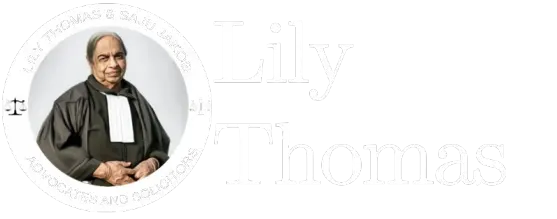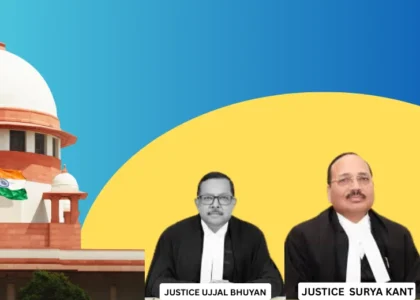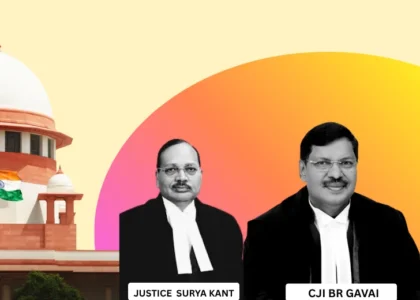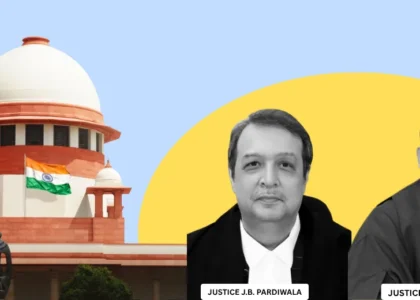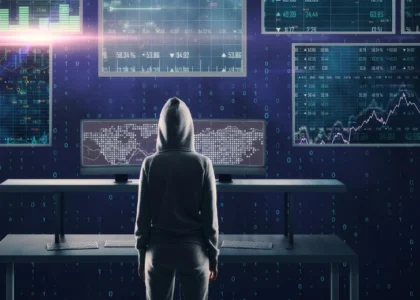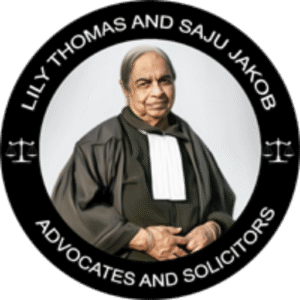Case Title:- In Re: Summoning Advocates Who Give Legal Opinion or Represent Parties During Investigation of Cases and Related Issues
Citation:- SMW(Cal) 2/2025
Date:- 31.10.2025
Hon’ble Supreme Court Bench:- Chief Justice of India BR Gavai, Justice K Vinod Chandran and Justice NV Anjaria
The Hon’ble Supreme Court ruled that documents belonging to clients but kept with their lawyers are not automatically privileged under Section 132 of the Bharatiya Sakshya Adhiniyam (BSA). However, such documents cannot be taken or examined freely strict legal procedures must be followed.
In criminal cases, if police or investigating officers want any client document from a lawyer, it must be produced only before the court, under Section 94 of the Bharatiya Nagarik Suraksha Sanhita (BNSS) read with Section 165 of the BSA. The court will supervise the entire process.
In civil cases, the production of such documents will follow Section 165 of the BSA and Order 16 Rule 7 of the Civil Procedure Code (CPC). The Hon’ble Court must hear both the advocate and the client before deciding if the document should be produced or admitted as evidence.
For digital devices like laptops or phones, if investigators seek their production, the device must be produced only before the jurisdictional court. The Hon’ble Court must notify the client, hear both sides, and if access is granted, the device can be examined only in the presence of the lawyer, client, and their chosen digital expert to protect confidential information.
The directions regarding production of documents and digital devices, as pronounced by the bench, are as follows :
- Production of documents from the possession of an advocate of the client will not be covered by the privilege under Section 132, either in a civil case or a criminal case.
- In a criminal case, the production of a document directed by a court or an officer shall be complied with by production before the Court under Section 94 of the BNSS being regulated also by Section 165 of the BSA.
- In a civil case, the production of document shall be regulated by Section 165 of BSA and Order 16 Rule 7 of the Civil Procedure Code. On production of such documents, it shall be upon the Court to decide any objections with respect to the order to produce and the admissibility of the document after hearing the advocate and the party whom the advocate represents.
- The production of digital devices under Section 94 BNSS, if directed by an investigating officer, the direction shall only be to produce it before the jurisdictional court.
- On production of a digital device by the advocate before the Court, the Court shall issue notice to the party with respect to whom the details are sought to be discovered from the digital device, and hear the party and the advocate on any objection to the production of the digital device, discovery from it and the admissibility of that discovery.
- If the objections are overruled by the Court, the device shall be opened only in the presence of the party and the advocate, who will be enabled due assistance of a person having expertise in digital technology of their choice. While examining the digital device, care shall be taken by the Court not to impact the confidentiality with respect to the other clients of the advocate, and disclosure shall be confined to what is sought by the investigating officer, if it is found to be permissible and admissible.
The Hon’ble Court also issued directions to regulate the issuance of summons, by ordering that advocates can be summoned only if the matter fell within the exceptions to attorney-client privilege under Section 132 of the BSA. Also, prior approval of a superior officer not below the rank of SP is necessary to issue summons to the advocate.
Directions
- Section 132 of the Bharatiya Sakshya Adhiniyam is a privilege conferred on the client obliging the advocate not to disclose any professional communications made in confidence. Investigating officers in the criminal cases, Station House Officers conducting preliminary enquiry in a cognizable offence, shall not issue a summons to an advocate who represents the accused to know the details of the case, unless it is covered under any of the exceptions under Section 132 BSA. When a summons is so issued to the advocate under any of the exceptions, it shall exclusively specify the facts on which the exception is sought to be relied upon, and shall also be issued with the consent of a superior officer not below the rank of a Superintendent of Police, who shall record his satisfaction as to the exception in writing before the summons is issued.
- A summons so issued shall be subject to judicial review at the instance of the advocate or the client under Section 528 BNSS.
- The advocate on whom there is an obligation of non-discolosure is one who is engaged in a litigation or in a non-litigatious or a pre-litigation matter.
- Production of documents from the possession of an advocate of the client will not be covered by the privilege under Section 132, either in a civil case or a criminal case. In a criminal case, the production of a document directed by a court or an officer shall be complied with by production before the Court under Section 94 of the BNSS being regulated also by Section 165 of the BSA. In a civil case, the production of document shall be regulated by Section 165 of BSA and Order 16 Rule 7 of the Civil Procedure Code. On production of documents, it shall be upon the Court to decide any objections with respect to the order to produce and the admissibility of the document after hearing the advocate and the party whom the advocate represents.
- The production of digital devices under Section 94 BNSS, if directed by an investigating officer, the direction shall only be to produce it before the jurisdictional court. On production of a digital device by the advocate before the Court, the Court shall issue notice to the party with respect to whom the details are sought to be discovered from the digital device, and hear the party and the advocate on any objection to the production of the digital device, discovery from it and the admissibility of that discovery. If the objections are overruled by the Court, the device shall be opened only in the presence of the party and the advocate, who will be enabled due assistance of a person having expertise in digital technology of their choice.While examining the digital device, care shall be taken by the Court not to impact the confidentiality with respect to the other clients of the advocate, and disclosure shall be confined to what is sought by the investigating officer, if it is found to be permissible and admissible.
- In-house counsels will not be covered under the protection under Section 132 BSA as they are not advocates practising in Courts. In-house counsel will be however entitled to protection under Section 134 BSA in so far as any communication made to the legal advisor, which however cannot be claimed for the communications between the employer and the in-house counsel.

